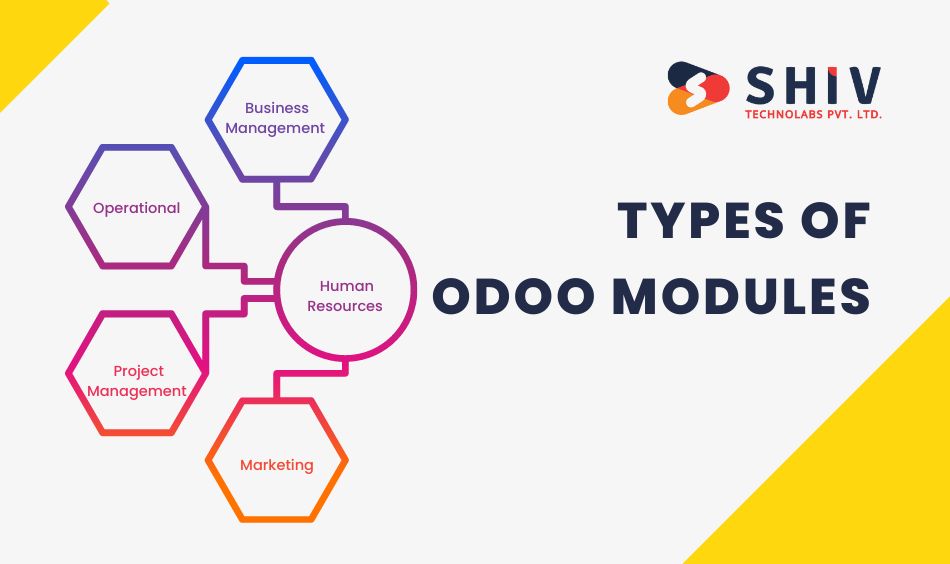Table of Contents
In today’s business environment, choosing the right ERP (Enterprise Resource Planning) system can influence a company’s efficiency and growth. Odoo is a popular open-source ERP platform which offers a modular approach to managing various business functions. This blog will guide you through the essentials of Odoo modules which includes their definitions, types and the distinction between modules and apps. Understanding these aspects is crucial for businesses looking to make informed decisions about implementing Odoo in their operations.
The global ERP software market is projected to reach $73.4 billion by 2026, reflecting a significant increase from previous years. This growth highlights the increasing adoption of ERP systems like Odoo, which are valued for their modular and adaptable design. Odoo’s flexibility is further demonstrated by the fact that over 7,000 active modules are available which allows businesses to select and customize functionalities to their specific needs. This capacity for customization is a key reason why many organizations turn to Odoo, supported by a network of experienced Odoo developers who facilitate the adaptation of the system to meet varied industry requirements.
In addition to its growing popularity, Odoo is noted for its wide-ranging applications across different sectors. According to recent studies, more than 5 million users globally rely on Odoo’s suite of applications to manage their business processes efficiently. The demand for Odoo customization services has risen as companies seek to tailor their ERP systems to better align with their operational goals. This demand underscores the importance of skilled developers who can deliver Odoo ERP solutions and optimize the system to meet unique business challenges.
What are Odoo Modules?

Odoo modules are the individual units within the Odoo ERP system which can address a specific area of business management. Odoo Modules are those components which can be added to or removed from the Odoo system based on the needs of a business. Each module handles particular tasks, such as managing sales processes, tracking inventory, or handling human resources.
# Functionality of Odoo Modules
- Customization: Modules can be adapted to fit particular business processes. Businesses can select the Odoo modules which suit best as per their requirements and configure them to align with their operational needs.
- Integration: Modules are designed to work together within the Odoo system, which allows a coordinated approach to various business activities. For instance, the Sales module can work with the Inventory and Accounting Odoo modules to facilitate a complete sales process.
- User Experience: Each module provides a focused set of tools and features, which helps in managing specific tasks efficiently. This design ensures that users can work with an interface tailored to their needs.
Are Odoo Modules Free?
The cost of Odoo modules varies depending on the version of Odoo being used and the source of the modules.
# Odoo Community vs. Odoo Enterprise
- Odoo Community: This version is open-source and free to use. It includes several core modules that offer essential functionalities needed by many businesses. However, it might lack some advanced features found in the Enterprise edition.
- Odoo Enterprise: This paid version includes additional features and premium support. The modules available in Enterprise are not free, but they provide advanced capabilities and enhanced performance tailored for larger organizations or those with more complex needs. Pricing depends on the number of users and the specific modules required.
- Additional Considerations: Even if using the Community version, there may be costs associated with modules developed by third parties. Additionally, businesses may need to consider expenses related to hosting, customization, and ongoing support.
Types of Odoo Modules

Odoo modules come in various types, each serving a different function within the ERP system. Here is an overview of some key categories:
# Business Management Modules
- Sales: Manages processes related to sales orders, quotations, and invoicing. This module integrates with other modules such as Inventory and Accounting to support a smooth sales workflow.
- Accounting: Handles financial transactions, generates financial reports, and ensures compliance with accounting standards.
# Operational Modules
- Inventory: Tracks stock levels, manages warehouse operations, and oversees logistics. This module is essential for businesses that deal with physical products.
- Purchasing: Manages relationships with suppliers, processes purchase orders, and handles procurement activities.
# Human Resources Modules
- Recruitment: Facilitates the hiring process, including job postings, application management, and candidate tracking.
- Payroll: Manages salary calculations, tax deductions, and compliance with employment laws.
- Customer Relationship Management (CRM): Tracks interactions with customers, manages leads, and oversees the sales pipeline. This module is vital for maintaining and improving customer relationships.
# Project Management
- Project: Organizes project planning, task assignments, and progress monitoring. This module is useful for teams working on complex projects and ensuring that objectives are met on time.
# Marketing
- Email Marketing: Designs and manages email campaigns, tracks their effectiveness, and analyzes campaign performance.
- Website: Builds and manages a business’s online presence, including e-commerce capabilities.
What is the Difference Between Odoo Modules and Apps?
In the context of Odoo, the terms “modules” and “apps” refer to different components of the system, though they are sometimes used interchangeably.
# Odoo Modules
- Definition: Modules are integral parts of the Odoo ERP system, each designed to provide specific functionalities. They are built into the core of the system and offer a range of features to support various business operations.
- Integration: Modules are designed to interact with each other within the Odoo environment, ensuring that information flows smoothly across different areas of the business. For example, the Inventory module integrates with Sales and Accounting to provide a unified approach to inventory management.
# Odoo Apps
- Definition: Apps are typically third-party applications that can be added to the Odoo system to provide additional features or enhancements. These apps might focus on specific functionalities not covered by the core modules.
- Flexibility: Apps can be downloaded from the Odoo App Store and may offer specialized capabilities or integrations. They can be used alongside existing Odoo modules or as standalone solutions.
# Key Differences
- Scope and Integration: Modules are core components of the Odoo system with a high level of integration, while apps are often more focused and may not integrate as deeply.
- Development and Support: Modules are developed and maintained by Odoo, ensuring a certain level of support and compatibility. Apps, on the other hand, are created by third-party developers and their support and updates can vary.
Also read : How Cloud ERP Solutions Build Data Security for Businesses
What are the Benefits of Using Odoo Modules?
Odoo modules offer several advantages that can significantly impact a business’s efficiency and adaptability. Here are some of the primary benefits:
# Flexibility and Scalability
Odoo modules allow businesses to start with a basic setup and gradually add more functionalities as needed. This modular approach supports growth and scaling, enabling companies to adapt the system to their evolving requirements without overhauling their existing setup.
# Integrated System
Modules are designed to work together within the Odoo ecosystem, facilitating smooth data flow and reducing the need for manual data entry. For example, when a sale is processed through the Sales module, the Inventory and Accounting modules are automatically updated, which helps in maintaining accurate records and improving overall efficiency.
# Cost Efficiency
For businesses using the Community version of Odoo, many essential modules are available for free. Even in the Enterprise version, the modular nature of the system means that businesses only pay for the functionalities they need, potentially reducing overall software costs compared to purchasing an all-inclusive ERP package.
# User Experience
Each module is designed with specific user needs in mind, providing focused features and interfaces. This specialization ensures that users can efficiently perform their tasks without navigating through unrelated features, making the system more intuitive and easier to use.
# Regular Updates and Support
Odoo regularly updates its modules, adding new features, improving performance, and addressing any issues. For businesses using the Enterprise version, Odoo provides dedicated support and maintenance, ensuring that the system remains up-to-date and reliable.
How Can Businesses Customize Odoo Modules to Suit Their Needs?
Customizing Odoo modules allows businesses to adapt the ERP system to their unique processes and requirements. Here’s how businesses can achieve this:
# Configuration Settings
Many Odoo modules come with built-in configuration options that allow businesses to adjust settings according to their needs. For example, in the Accounting module, users can configure tax rules, reporting formats, and other preferences to match their local regulations and business practices.
# Custom Fields and Views
Odoo allows for the addition of custom fields and modifications to existing views within modules. Businesses can create fields that capture specific information relevant to their operations and adjust the user interface to display data in a way that aligns with their workflows.
# Module Development
For more advanced customization, businesses can develop custom modules or modify existing ones. Odoo’s open-source nature means that developers can access the source code and make changes to suit specific requirements. This approach might involve creating new features, integrating with other systems, or altering existing functionalities.
# Third-Party Apps
Businesses can also use third-party apps from the Odoo App Store to extend the capabilities of existing modules. These apps can add new features or integrations that are not available in the core modules, providing additional customization options.
# Consulting and Development Services
For complex customization needs, businesses might consider engaging with Odoo consultants or developers. These professionals can provide expertise in configuring, developing, and integrating modules to meet specific business requirements.
Also read : A Comprehensive Guide to Optimize Website With SEO Tools in Odoo 17
What are Some Challenges Businesses Face When Using Odoo Modules?
While Odoo modules offer many benefits, businesses may encounter some challenges. Here are a few common issues:
# Complexity of Customization
Customizing Odoo modules, especially for unique business needs, can be complex. Modifying the core system or developing custom modules requires technical expertise, which might be a barrier for businesses without in-house development resources.
# Integration Issues
Although Odoo modules are designed to work together, integrating with external systems or third-party apps can sometimes present challenges. Businesses might face difficulties in ensuring that data flows correctly between Odoo and other software applications.
# Cost Considerations
While the Community version of Odoo is free, businesses might incur costs related to third-party apps, custom development, or the Enterprise version. Additionally, ongoing costs for hosting, support, and maintenance can add up.
# Learning Curve
Implementing Odoo and configuring its modules can involve a learning curve for users. Proper training and familiarization are necessary to ensure that employees can effectively use the system and take full advantage of its features.
# Performance Issues
As businesses add more modules and customizations, the performance of the Odoo system might be affected. Ensuring that the system runs efficiently requires regular monitoring and optimization, which can be challenging for larger setups or those with extensive customizations.
Conclusion
Odoo modules provide a powerful and flexible approach to managing various business functions. Their modular structure allows companies to select and integrate the functionalities they need, offering a solution that can grow and adapt with their operations. Whether utilizing the free Community version or the more advanced Enterprise edition, businesses can benefit from the ability to customize and expand their Odoo system to fit specific requirements.
However, it’s important to be aware of potential challenges, including the complexity of customization and integration issues. By understanding these aspects, businesses can make more informed decisions and effectively implement Odoo to improve their operations.
For businesses looking to implement or enhance their Odoo ERP system, Shiv Technolabs stands out as a leading Odoo development company in Saudi Arabia. With a deep understanding of Odoo’s modular architecture, Shiv Technolabs offers expert services in customizing and developing Odoo modules to meet the unique needs of businesses. Our team is dedicated to delivering solutions that integrate smoothly with your existing processes, ensuring you get the most out of your ERP investment. Reach out to Shiv Technolabs to see how we can support your business with professional Odoo development and make your ERP journey a success.




















